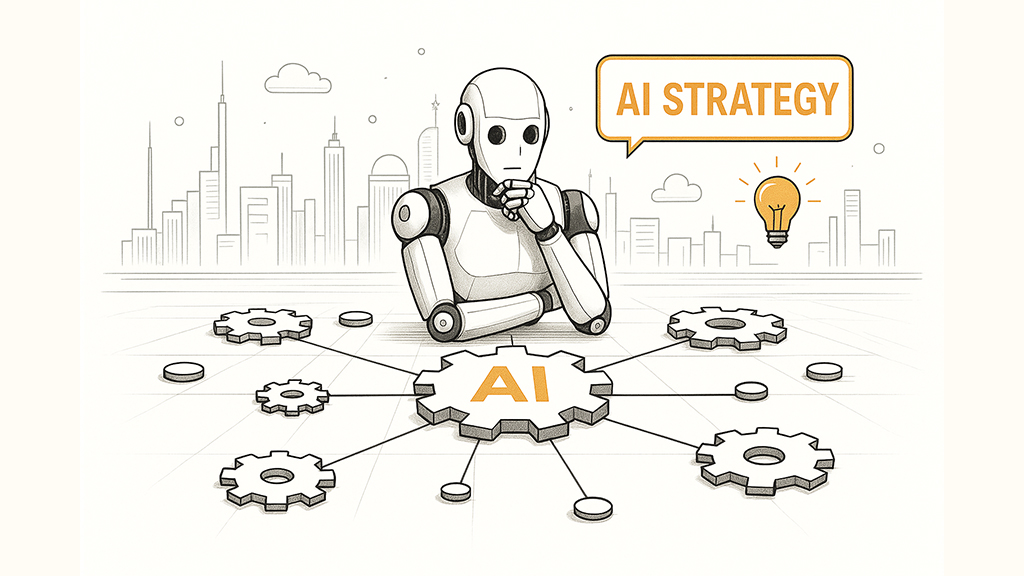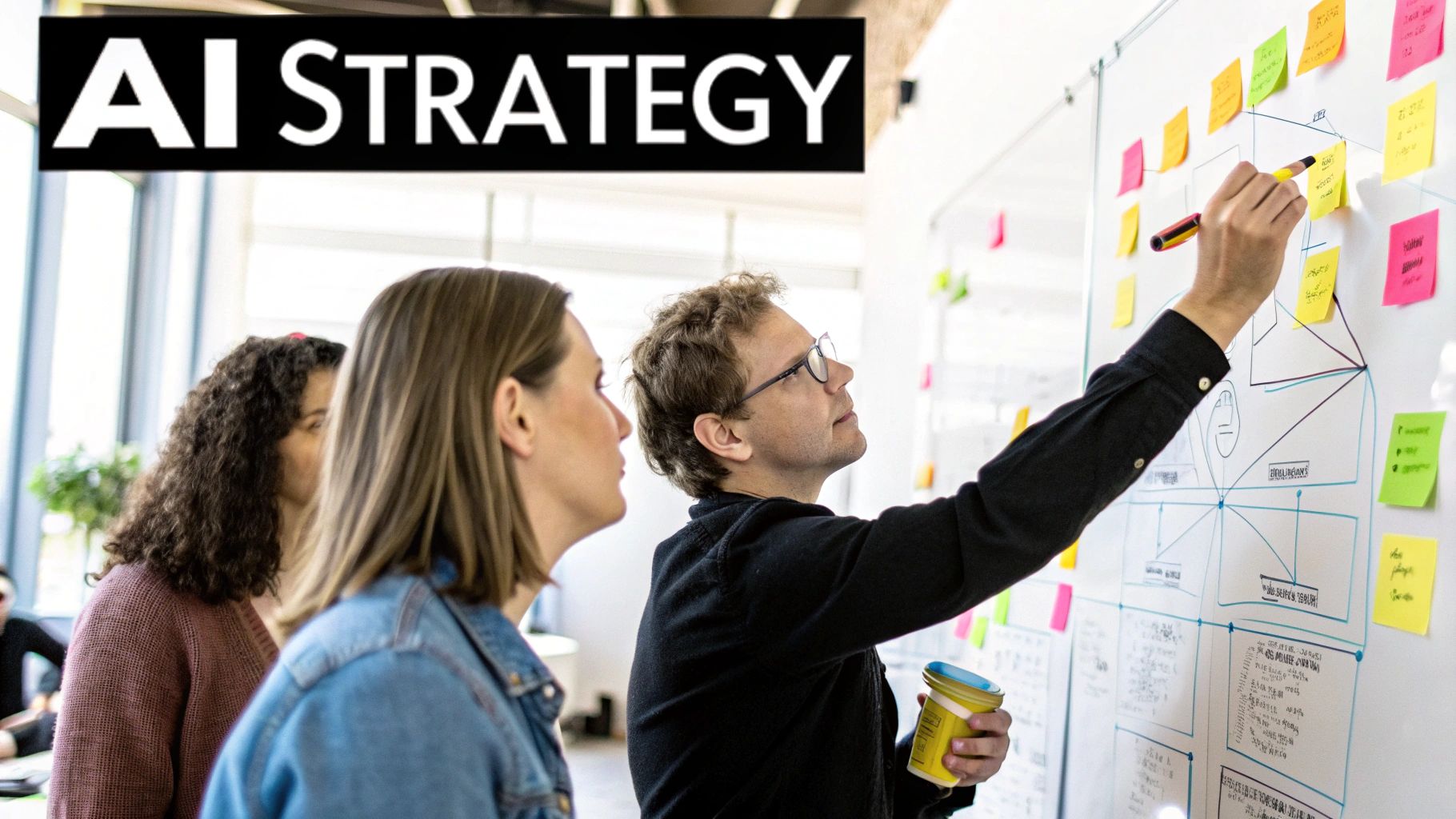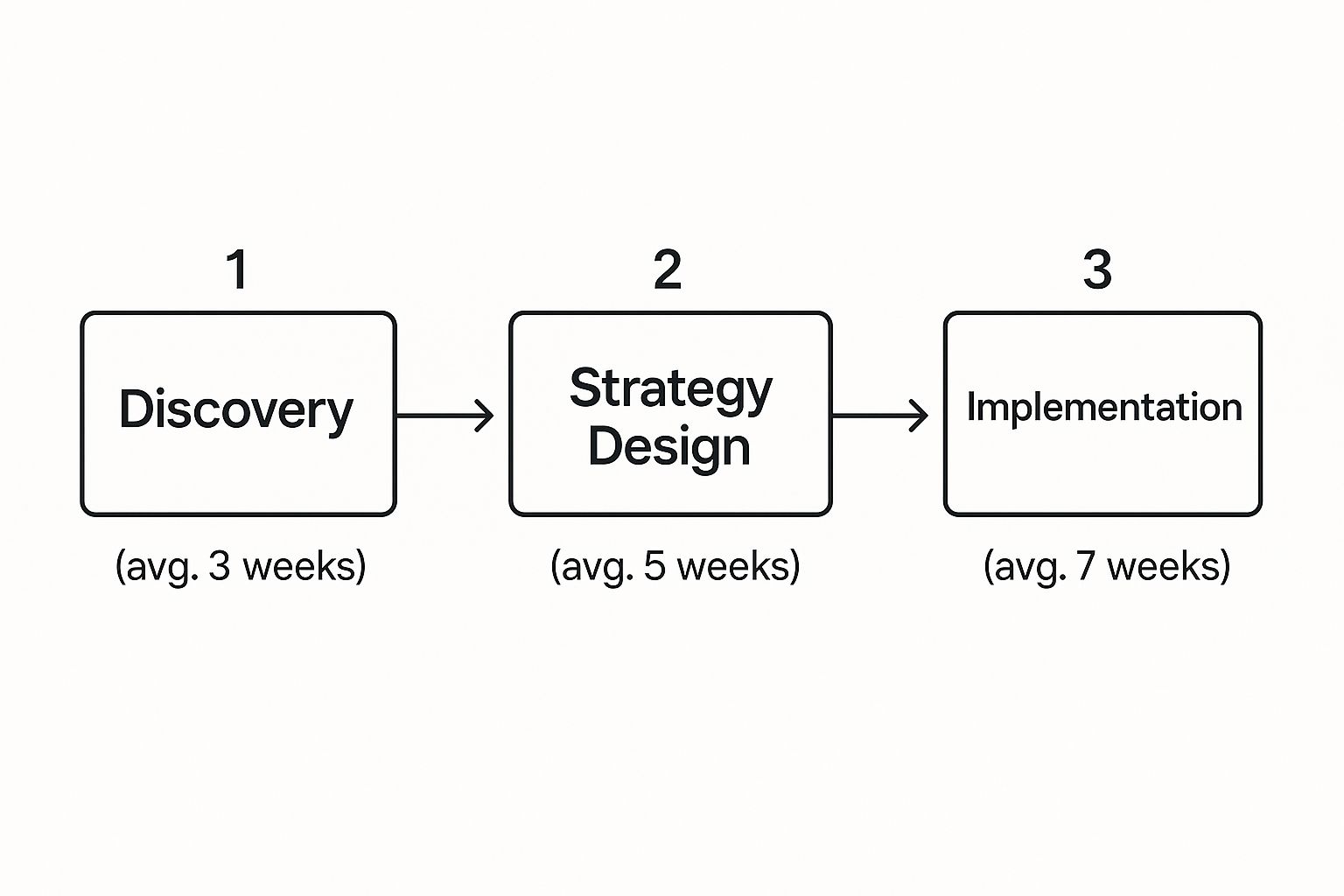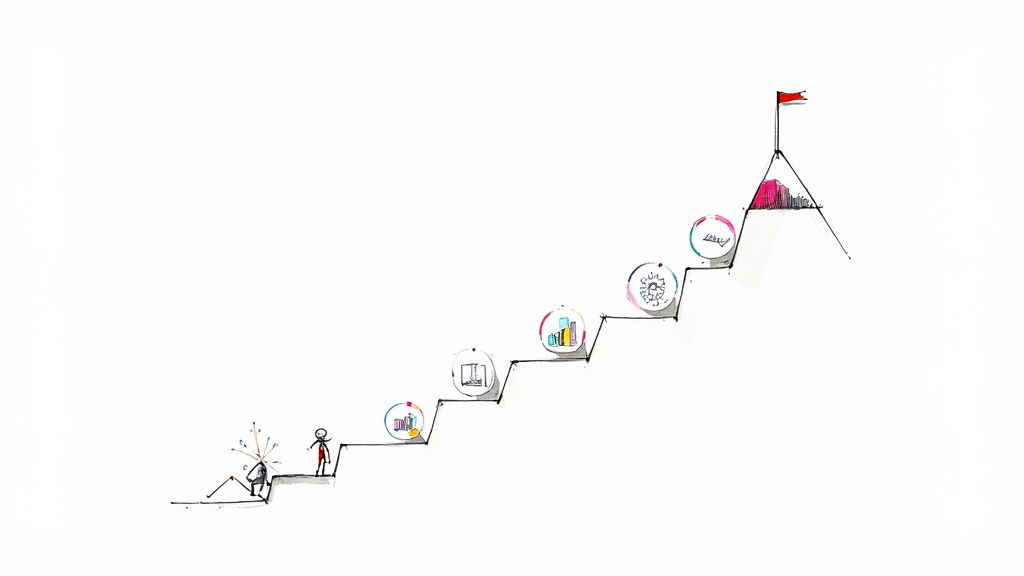Transform Your Business with Expert AI Consulting
Discover top AI consulting services to boost your business growth. Get expert guidance today and stay ahead with innovative AI solutions.

Understanding What AI Consulting Really Means for Your Business
At its heart, AI consulting is the bridge connecting the powerful world of artificial intelligence to your unique business objectives. Think of an AI consultant as an expert guide and interpreter who is fluent in both technology and business operations. You wouldn't navigate a complex legal case abroad without a lawyer; in the same way, diving into AI without seasoned guidance can lead to expensive mistakes and missed opportunities. It's a common belief that AI is here to replace human expertise. The reality is the opposite: AI is a tool designed to amplify your team's skills and insights.
The main role of an AI consulting partner is to cut through the noise and develop a clear, achievable plan. They translate the abstract idea of AI into concrete solutions that solve real business problems. Instead of overwhelming you with technical jargon, a good consultant begins by understanding your operational challenges, market standing, and growth goals. This business-first method makes sure that any AI solution is directly linked to a measurable result, turning AI from a confusing expense into a smart investment.
From Possibility to Practicality
 The journey starts by looking past the hype. A skilled AI consultant helps you figure out what is just technically possible with AI versus what is genuinely practical and valuable for your company. This means taking an honest look at your data quality, current technology, and your team's abilities. For instance, a retail company might be interested in using predictive analytics to understand customer habits. An AI consultant would first check the quality and amount of their sales data, then suggest a small pilot project to test the idea before committing to a full-scale rollout. This step-by-step approach reduces risk and builds confidence.
The journey starts by looking past the hype. A skilled AI consultant helps you figure out what is just technically possible with AI versus what is genuinely practical and valuable for your company. This means taking an honest look at your data quality, current technology, and your team's abilities. For instance, a retail company might be interested in using predictive analytics to understand customer habits. An AI consultant would first check the quality and amount of their sales data, then suggest a small pilot project to test the idea before committing to a full-scale rollout. This step-by-step approach reduces risk and builds confidence.
The need for this kind of expert guidance is growing fast. The global AI consulting services market is expected to grow substantially, from $11.07 billion to an estimated $90.99 billion by 2035. While North America initially led the way, Europe—including the Netherlands—is experiencing strong growth. This is mainly pushed by industries like finance, healthcare, and manufacturing that need expert help with AI strategy, technology integration, and long-term support. You can explore a recent industry report on AI consulting services for more details on this market expansion.
The True Role of an AI Consultant
Ultimately, an AI consultant's job is to make sure your AI projects deliver real value. They achieve this by concentrating on several key areas:
- Strategic Alignment: Making certain every AI project supports a core business goal, like boosting revenue, improving efficiency, or increasing customer happiness.
- Risk Mitigation: Pinpointing potential problems, from data privacy concerns to technical integration issues, and creating plans to avoid them.
- Capability Building: Assisting your internal team in gaining the skills needed to manage and maintain AI systems for the long term.
- Vendor-Agnostic Advice: Offering impartial recommendations on the best tools and platforms for your specific situation, rather than promoting a particular product.
By building on these foundations, an AI consulting partnership prepares your business for successful and scalable AI adoption. For companies that want to build a clear AI strategy without the high price tag of traditional consulting, new platforms are available to help guide the process. You can see how a modern AI strategy platform operates by exploring how Ekipa AI helps organisations discover and act on their AI opportunities.
The Strategic Advantages That Make AI Consulting Worth Your Investment
Working with an AI consultant is about more than just automating a few tasks; it delivers compounding benefits that can genuinely reshape how your business operates and competes. Think of it as bringing in a strategic partner who can see hidden opportunities within your current setup. They help you anticipate market shifts, find new ways to improve processes, and uncover revenue streams buried in your data. This is where AI consulting truly shines—turning technology into a real competitive advantage.
Forward-thinking companies use AI consulting to make faster decisions, cut down on operational waste, and build a market position that is hard for others to copy. This kind of investment provides both quick wins and lasting strategic value.
Immediate Wins and Long-Term Gains
The first returns you'll likely see from AI consulting come from improved efficiency. For instance, automating repetitive admin tasks or making your supply chain logistics more effective can lead to immediate cost savings. This frees up your team to concentrate on more important work and provides the quick wins that justify the initial cost.
However, the deeper benefits show up over time. A well-designed AI strategy, guided by an expert consultant, can lead to:
- Predictive Capabilities: Instead of just reacting to market changes, you can start to anticipate them. This might mean forecasting customer demand with better accuracy or spotting potential equipment failures before they cause downtime.
- Better Customer Experiences: AI allows you to personalise interactions at scale, offering custom recommendations and support that build strong customer loyalty.
- Data-Driven Innovation: Consultants help you make sense of your data, uncovering insights that could spark entirely new products, services, or business models.
Building a Defensible Competitive Edge
The most significant benefit of AI consulting is creating a competitive advantage that lasts. While a competitor might eventually copy a product or a marketing campaign, it's much more difficult to replicate a business model that is deeply integrated with custom AI and driven by data. This effectively builds a protective "moat" around your business.
This strategic approach is becoming more crucial as AI becomes more common. In the Netherlands, the AI market is expected to reach approximately US$2.38 billion in 2025 and is projected to grow to about US$9.64 billion by 2031. This rapid growth highlights the need for businesses to have a clear AI strategy to stay competitive. You can learn more about the Dutch AI market growth and what it means for different industries. By partnering with an AI consultant, you go from merely using AI tools to building an intelligent, adaptable organisation ready for whatever comes next.
Industry-Specific Applications: How AI Consulting Adapts to Your Sector

Effective AI consulting is not a one-size-fits-all service; it's a specialised practice that adapts to the unique challenges and opportunities within your specific industry. Think of it like this: a general practitioner is great for a routine check-up, but for a complex heart issue, you need a cardiologist. Similarly, AI consultants develop deep expertise in particular sectors, understanding the distinct regulatory hurdles, competitive dynamics, and operational realities that broad approaches often overlook. This specialised knowledge is what transforms a general technology into a precise business solution.
This focused method is becoming standard practice. AI consulting in the Netherlands, for instance, is increasingly geared towards industry-specific solutions. Instead of offering generic services, Dutch firms are creating systems for key sectors like logistics, agriculture, and healthcare. This targeted strategy is driven by the need for AI that grasps sector-specific problems, such as forecasting fluctuating delivery volumes or modelling complex biological systems. You can discover more insights about these AI consulting trends and how they are shaping the market. This highlights a critical point: AI's true value is realised when it is applied with a deep understanding of its context.
Tailoring AI Solutions for Maximum Impact
An expert AI consultant acts as a translator, converting industry-specific problems into a language that machine learning models can understand and solve. They know which data points are crucial, what success looks like for a particular sector, and how to navigate compliance. Let's see how this works in a few different fields.
- In Healthcare, AI consultants help hospitals analyse medical images with greater accuracy, predict patient readmission rates, and optimise operating theatre schedules. They understand the critical importance of data privacy under regulations like GDPR and design systems that are both effective and compliant.
- For Manufacturing, the focus might be on predictive maintenance. A consultant would help a factory use sensor data from machinery to forecast when a part is likely to fail, scheduling repairs proactively to avoid costly unplanned downtime. This requires in-depth knowledge of industrial equipment and production workflows.
- In the Retail sector, AI consulting often centres on personalisation. Consultants help businesses build recommendation engines that analyse customer behaviour to suggest relevant products, improving both sales and customer loyalty. They also work on optimising inventory to prevent stockouts and reduce waste.
Why Specialised Consulting Delivers Better Results
Choosing a consultant with direct industry experience gives you a significant head start. They already know the common pain points and have a set of proven solutions, which shortens the time it takes to see value from your investment. This specialisation ensures the final solution is not just technically sound but also practically useful and perfectly aligned with your business objectives.
To illustrate how AI consulting is customised for different needs, the table below offers a comprehensive comparison of its applications across key sectors.
AI Consulting Applications Across Key Industries
A comprehensive comparison showing how AI consulting addresses specific challenges and opportunities in different sectors
Industry
Primary AI Applications
Key Benefits
Implementation Timeline
Finance
Fraud Detection, Algorithmic Trading, Personalised Banking, Credit Scoring
Enhanced Security, Higher Returns, Improved Customer Experience, Reduced Risk
3-9 Months
Healthcare
Diagnostic Imaging, Predictive Analytics for Patient Outcomes, Drug Discovery, Administrative Automation
Improved Accuracy, Better Patient Outcomes, Faster Research Cycles, Reduced Admin Costs
6-18 Months
Retail
Personalised Marketing, Dynamic Pricing, Inventory Management, Customer Service Chatbots
Higher Engagement, Optimised Margins, Lower Waste, Improved Satisfaction
4-12 Months
Manufacturing
Predictive Maintenance, Quality Control with Computer Vision, Supply Chain Optimisation
Reduced Downtime, Fewer Defects, More Efficient Logistics, Increased Productivity
6-24 Months
As the table shows, the problems solved and benefits gained are highly specific to each industry's operational model. This sector-focused approach is what makes strategic AI consulting so powerful. It moves beyond generic applications and delivers solutions that are finely tuned to solve the real-world problems your business faces every day.
How an AI Consulting Engagement Works
Understanding the flow of an AI consulting project helps set clear, realistic expectations for everyone involved. Think of it like building a custom home: you wouldn't start laying bricks without a plan. You need a structured sequence of discovery, architectural design, construction, and a final inspection. Each stage has specific goals and outcomes, making sure the final result matches the original vision. A typical AI project follows a similar, well-defined path.
The journey starts with understanding your business goals and moves through strategy development, building a small-scale model, implementing the full solution, and finally, providing ongoing support. This organised approach ensures the project delivers real business results, not just a flashy tech demo. It also clarifies roles and fosters strong collaboration from day one.
The Phased Approach to AI Implementation
Most AI consulting projects are divided into distinct phases. This method helps manage complexity, keep costs in check, and show progress at every step. While the exact timing can change based on the project's needs, a typical engagement follows three main stages.
The infographic below shows a common timeline for the initial phases of an AI consulting project.

This process highlights that a project can take several months. The implementation phase is often the longest, which shows why a solid strategy is so important before any code is written.
Let's explore what happens in each phase:
- Phase 1: Discovery & Assessment: This first stage is all about listening and learning. The consultants dive into your business to grasp your specific challenges, strategic aims, and how you operate day-to-day. Activities include talking to key people, holding workshops, and checking your current data and systems. The main goal is to find and prioritise the best AI opportunities that fit your business objectives. The key output is usually a feasibility report and a ranked list of potential projects.
- Phase 2: Strategy Design & Proof-of-Concept (PoC): After choosing a high-impact use case, the focus turns to designing the solution. This means creating a detailed project plan, setting success metrics (KPIs), and mapping out the technical setup. To test the idea without the cost of a full build, a Proof-of-Concept (PoC) is often developed. A PoC is a small, working model built to test a core idea and show the potential value of the AI solution. A successful PoC gives the team the confidence and business justification to move forward.
- Phase 3: Full Implementation & Integration: Once the PoC proves successful, the project goes into full development. This is where the AI model is built, trained, and thoroughly tested. The solution is then woven into your existing workflows and business processes. This phase demands close teamwork between the consultants and your internal IT and business teams for a smooth launch. Guiding employees through the change and providing training are also vital for getting everyone on board. The final result is a fully working AI system that is actively adding value to your organisation.
To give you a clearer picture of how these phases come together, the table below outlines the typical activities, timelines, and deliverables for an AI consulting project.
AI Consulting Engagement Phases and Deliverables
A detailed breakdown of typical AI consulting project phases, timelines, and expected outcomes at each stage.
Phase
Duration
Key Activities
Deliverables
Success Metrics
1: Discovery & Assessment
2-4 weeks
Stakeholder interviews, business process analysis, data infrastructure audit, use case workshops, ROI analysis.
Feasibility Report, Prioritised AI Use Case List, High-Level Business Case.
Identification of at least 2-3 high-impact, feasible AI opportunities.
2: Strategy & PoC
4-8 weeks
AI solution architecture design, KPI definition, data preparation, PoC model development and testing.
Detailed Project Roadmap, Technical Architecture Document, Functional Proof-of-Concept (PoC).
PoC achieves >80% of predefined success criteria, clear ROI projection.
3: Implementation & Integration
12-24 weeks
Full-scale model development, system integration with existing platforms, user acceptance testing (UAT), change management.
Fully Deployed AI Solution, User Training Manuals, Technical Documentation.
95% system uptime, achievement of target business KPIs (e.g., 15% cost reduction).
4: Optimisation & Support
Ongoing
Performance monitoring, model retraining with new data, algorithm refinement, identifying new features.
Quarterly Performance Reports, Model Version Updates, Ongoing Support & Maintenance.
Sustained or improved model accuracy, positive user feedback, long-term ROI growth.
This table shows the structured progression from an idea to a fully functioning and supported AI solution, with clear checkpoints and outcomes at every stage.
Beyond Implementation: Ongoing Optimisation
A successful AI consulting project doesn't stop at the launch. Like any advanced system, AI models need continuous monitoring and fine-tuning to make sure they perform well and continue to deliver value. This might involve retraining the model with fresh data, tweaking algorithms, or finding new ways to make improvements. The best partnerships are set up to offer this long-term support, ensuring your AI investment provides lasting returns. This cycle of continuous improvement is what turns a one-off project into a genuine business asset.
Selecting the Right AI Consulting Partner for Your Organisation
Choosing an AI consulting partner is like picking a co-pilot for a critical business journey. You need a partner who not only understands your final destination but can also expertly navigate unexpected turbulence and adapt the flight plan when conditions change. With the market for AI services expanding so quickly, it’s becoming harder to separate genuine expertise from clever marketing. Making the right choice requires a structured approach that looks beyond a flashy presentation.
This process involves carefully checking a potential partner’s technical skills, industry background, cultural fit, and how they manage projects. Think of it as conducting due diligence before a major investment—because that is exactly what it is. A successful partnership can accelerate your growth, while a poor one can lead to wasted time, budget overruns, and frustration. The key is to ask the right questions and know what to look for.
Core Criteria for Evaluating AI Consultants
When you start your search, focus on a few fundamental areas to build a shortlist of qualified candidates. These core criteria will help you filter out firms that are not a good fit and concentrate on those with the potential to be true strategic partners.
- Technical Proficiency and Platform Agnosticism: A great consultant has deep technical knowledge but doesn't push a single technology. They should be platform-agnostic, meaning they recommend the best tools for your specific problem, not just the ones they prefer or have a partnership with. Ask them about their experience with different AI models, cloud platforms (like AWS, Azure, and Google Cloud), and data engineering tools. Their ability to explain complex technical concepts in simple business terms is a strong indicator of their expertise.
- Verifiable Industry Experience: As discussed earlier, industry-specific knowledge is non-negotiable. A consultant who has solved similar problems in your sector will understand your unique regulatory environment, competitive pressures, and operational challenges. Ask for case studies or references from previous clients in your industry. A firm that proudly showcases a portfolio of successful, relevant projects demonstrates its capability to deliver real-world results, not just theoretical solutions.
- Cultural Fit and Collaborative Spirit: This is often an overlooked but critical element. The consultants will be working closely with your team. Do their communication styles align with your company culture? Do they see themselves as collaborative partners or just as external vendors? A good partner challenges your assumptions constructively and works with your team to build skills and foster adoption. This collaborative spirit is essential for long-term success and ensuring the AI solution is embraced by your organisation.
Understanding Service Models and Pricing
AI consulting firms offer different engagement and pricing models. Understanding these structures helps you find a partnership that aligns with your budget and project goals.
Service Model
Description
Best For
Typical Pricing Structure
Project-Based
A fixed scope, timeline, and price for a specific deliverable, like an AI strategy or a proof-of-concept.
Organisations with a clearly defined problem and desired outcome.
Fixed Fee
Retainer-Based
Ongoing access to a team of experts for a set number of hours per month.
Businesses needing continuous AI guidance, optimisation, and support.
Monthly Retainer
Time and Materials
You pay for the hours worked and materials used. Offers flexibility but can be less predictable for budgeting.
Projects where the scope is likely to evolve or is not well-defined at the start.
Hourly/Daily Rate
During your evaluation, ask for a clear breakdown of all potential costs, including any licensing fees for software or ongoing maintenance charges. Transparency in pricing is a hallmark of a trustworthy partner. Beware of proposals that are vague about costs or include hidden fees. By carefully assessing their technical depth, industry track record, collaborative approach, and transparent business practices, you can confidently select the right AI consulting partner to guide your organisation’s journey.
Measuring Success and Maximising Your AI Consulting ROI

Starting a partnership with an AI consulting firm means you need a clear way to measure its worth. Success isn't always a single, dramatic event. It's more like tending a garden: some benefits, like cost savings, sprout quickly, while others, like a stronger market position, take time to grow. A balanced view is necessary to appreciate both the immediate wins and the deeper value that might take months, or even years, to fully blossom. Without a proper framework, you might misjudge the project's real effect and miss chances to improve.
To properly assess the value of your AI investment, it helps to split your measurements into two types: leading indicators and lagging indicators. This separation is crucial for understanding the complete story of your project's performance and explaining its value to everyone involved.
Leading Indicators: The Early Signs of Success
Leading indicators are the immediate signs that your project is heading in the right direction. They give you early proof that the AI solution is working as planned and providing initial benefits. Think of them as the first green shoots in your garden—they confirm your efforts are beginning to bear fruit.
Key leading indicators include:
- Operational Efficiency Gains: This is often the first visible benefit. For instance, an AI tool that automates invoice processing could cut the average time spent on each invoice by 40%. This is a concrete, easily measured improvement.
- User Adoption Rates: Are your employees using the new system? High adoption rates show that the tool is easy to use and is solving a genuine problem for your team.
- Model Accuracy: For predictive models, how well does the AI perform against its goals? A fraud detection model that correctly flags 95% of suspicious transactions is a clear early win.
These metrics are key for building momentum and confidence in the project's early days. They offer the positive feedback needed to justify continued support and investment from leadership.
Lagging Indicators: Measuring Long-Term Business Impact
While leading indicators are important, the true return on investment (ROI) from AI consulting often shows up in lagging indicators. These are the wider business results that appear after the AI solution has been part of your operations for a while. They reflect the strategic value and competitive edge you've gained.
Lagging indicators to keep an eye on include:
- Cost Reduction: After six to twelve months, what are the total savings from reduced labour, fewer mistakes, or less waste?
- Revenue Growth: Has the AI solution helped increase sales through better personalisation or by identifying new market opportunities?
- Customer Lifetime Value (CLV): AI-driven customer service or product recommendations can lead to happier, more loyal customers, which increases their lifetime value.
- Time to Market: Has AI-powered automation helped you develop and launch new products or services more quickly?
Tracking these long-term metrics is essential for understanding the full financial and strategic return. It shifts the discussion from technical performance to real business effects. By setting benchmarks for both leading and lagging indicators at the beginning of your AI consulting engagement, you create a clear and complete picture of success, ensuring your investment provides lasting value.
Key Takeaways: Your AI Consulting Success Blueprint
Now that you have a solid grasp of what AI consulting is all about, you're in a great position to make decisions that can lead to real business growth. Think of this blueprint as a practical roadmap, summarising the essential points we've covered. It offers clear frameworks for figuring out if you're ready, choosing the right strategy, and sidestepping common issues that can trip up even the most promising AI projects.
This isn't just about plugging in new software; it's about preparing your organisation for a different way of working. By following a structured approach, you can rally internal support, get your teams ready for the shift, and lay a strong groundwork for future success.
Your Strategic AI Readiness Checklist
Before you start talking to any external partners, it’s vital to look inward. A successful AI project always starts with being properly prepared. Use this checklist to see where you stand and what areas might need some work:
- Define a Clear Business Problem: Always begin with "why." What specific operational hurdle or business opportunity are you trying to tackle? A clearly defined problem is the most important first step.
- Assess Your Data Foundation: AI is fuelled by data. Take a hard look at the quality, accessibility, and relevance of your data. Is it clean, organised, and do you have enough of it to power your intended project?
- Secure Executive Sponsorship: An AI project needs a champion at the top. Make sure you have strong support from leadership to secure the necessary resources and keep the initiative moving forward.
- Evaluate Internal Skills: Be honest about what your team can and can't do right now. Pinpointing skill gaps early helps you understand exactly where an AI consulting partner can add the most value.
A Framework for Action
Once you've done your internal health check, you can proceed with confidence. This framework breaks down the essential steps for a successful partnership, from picking the right consultant to creating long-term value.
Step
Key Action
Primary Goal
1. Partner Selection
Perform detailed checks focusing on industry experience, technical skill, and whether they're a good cultural fit.
Find a partner who gets your specific business world, not just the technology itself.
2. Phased Engagement
Kick things off with a small, clearly defined pilot project or proof-of-concept (PoC).
Test the strategy and show some early wins to build momentum and get everyone on board.
3. Metric-Driven Approach
Set clear measures for success—both short-term (like efficiency gains) and long-term (like ROI).
Create a transparent way to track progress and keep everyone accountable.
4. Fostering Adoption
Keep your team involved from start to finish and invest in training and change management.
Ensure the final solution isn't just installed but is actively used and embraced by your organisation.
Following this blueprint helps make sure your approach to AI consulting is strategic, measured, and aimed at delivering meaningful business results that justify the investment.
Ready to put these ideas into practice? Ekipa AI offers a next-generation AI strategy platform to help you find and act on your best AI opportunities. Get your tailored AI strategy in 24 hours and start building your future.



